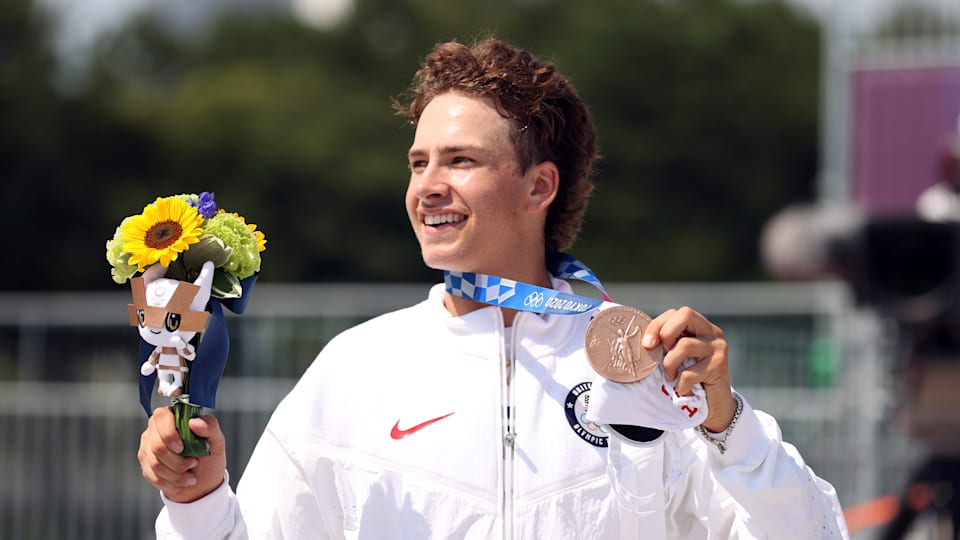Jagger Eaton: Back, refreshed and ready to take on the world
After experiencing intense highs, profound lows and the painful reality of a broken body at Tokyo 2020, Eaton took a step back from skateboarding to regroup. Now, speaking in an exclusive interview ahead of the Street and Park World Championships, he says he's all set to go again.

“Man, it’s hard to talk about these feelings,” Jagger Eaton says after a long pause. “I haven’t talked about these feelings for a while.”
It’s early January and the 21-year-old street skateboarding Olympic bronze medallist has joined the Olympics.com podcast to talk about the year ahead.
For the American, it promises to be big with a number of Paris 2024 qualification events for street and park skateboarding on the horizon. The decision to once again try to qualify for both is a hint of the renewed hunger the man from Arizona is bringing to 2023.
But for Eaton, real talk of the future and the person he is now can only begin by first looking back.
Back to the pain and the ecstasy he enjoyed and endured in equal measure at Tokyo 2020, in 2021. Back to the medal that fundamentally altered his life, and back to the moment he decided that - if he wanted to be his best - something had to give.
Jagger Eaton: Injury and the fight for the Olympics
“When I look back at it now, starting this new journey, I'm thinking that journey to Tokyo changed my life forever and changed my perception on everything in my life,” Eaton starts with a disarming frankness.
“It changed everything. All my relationships with my family, with my parents, with my friends, with my skateboard.”
The journey which Eaton alludes to began six months out from Tokyo 2020 in Des Moines, Iowa at the Park World Championships.
Needing a strong finish to qualify, the American was aware only his best would be good enough. But with every ligament in his left ankle at least 90 per cent torn and his upper ankle sprained, the skateboarder knew delivering it would be impossible.
He ultimately finished the contest in fifth, two places shy of the cut-off.
“I was incredibly defeated,” Eaton says. "I just didn’t want to skate. I didn’t want to compete. I was just so upset with myself and what happened."
Staying true to a promise he had made to himself months previously to commit everything to make an Olympic team, the American decided to try his luck at the final street qualification event in Rome.
Eaton had to finish in at least the top four in Italy. But he was still injured.
Yet somehow, on his last attempt on his final trick, he did enough to make it.
Elated, he savoured the moment, but only for so long. During the semi-finals of the contest, Eaton had further fractured his ankle in two places and knew deep down that it would not be anyway near recovered for the Games he had just fought so hard to make.
He decided not to tell anyone and compete.
“I didn't tell anybody, and I think it's really because I didn't want to give it that mental energy. I just didn't want to even notice that it was there,” Eaton explains recalling his Olympic experience.
“I woke up that morning not thinking that my ankle was broken, that I wasn't going to be able to do what I want to do. My mindset was the fact that I'm able to walk, the fact that I'm able to go out there and skate to 75, 80 per cent of my ability that's what I'm going to live in; like I'm living in that mindset.
“There was a lot of pressure. But the pressure that I felt that day was, if I were to fall wrong, I wouldn't be able to walk out of that park. I’d have to get carried off, and that's not how I wanted to leave. That's not how I want to go out there. And if I'm going to go out swinging, I'm going to be the last guy on my feet.”
With an eclectic mix of old country music and new rap blaring in his ears, against the odds, Eaton finished the inaugural men’s Olympic street competition with the bronze medal.
After, he shared with the world the truth of how he had done it. The achievement became a little more real each time he explained but it only started to sink after the medal was placed around his neck:
“Getting that medal and being on that podium was always the goal. And really, when it was over, I was just looking at the medal and I'm so grateful that this is done. It was just so hard.
“The medal is just a little bit token that I get to look back in and realise how deep that I can dig into myself to get the best out of myself.”
Jagger Eaton: Paying the price for X Games gold
Eight months after Eaton’s lifechanging Olympic moment, the American returned to Japan for X Games competing in the park and street skateboard contests.
After successfully qualifying for the park final taking place the following day, Eaton was out on the street course practising when, once again, injury struck.
A fall from a 10-stair handrail left him with a badly torn hip, and in an all-too familiar position:
“I woke up that morning and I could barely walk. And I was just telling my coach, I'm like, 'Guy, we're just going to send it. We're just going to dig. Right? It's like all we got. We're in Japan. We might as well leave it all out there.'
“And park went my way, and it went great. I had to compete both events that day and I competed street. It was raining at the time during the contest, we only got one run and I was just really struggling with impact and flicking my board and walking straight and all of that. So, street didn't go the way I wanted to.
“After the contest, me and my coach talked and I told him, I said, 'I don't want to do this anymore. I don't want to have to dig that deep. And I don't, I really don't, want to have to compete this injured.' And he goes, 'OK, let's go home. Let's take a break. Let's get into crazy shape, let's get you healed and get back to it.' And that's what I did.”
Despite winning his first X Games gold, Eaton's exhaustion was such that he made the decision to step away from skateboarding. “I just fell off the earth,” he says.
As well as physically resting and retraining his body, the Olympic medallist devoted much of his time to working on his mental health and his relationship with his sport:
“I know what it's like to really hate something that you've done your whole life, what you've dedicated your life to. I know what it's like to hate it so much. And most of time when you hate it that much, there's something that you love about it. There's something that you can't live without it, when you have that much hate towards it and then you just find it again. You just find the passion and the love, and it happens. And then from there it's just things start get rolling again.”
Jagger Eaton: Olympics, World Championships and staying grateful
Rested and recovered, Eaton says he is now ready to go again.
“The ambition is to win two gold medals for the USA. That's the goal. Going into this year, I wrote it all down, I have all my notes. I know what it takes. I have a really good team around me that understands my goals, that understands my ambitions, and kind of clears the way for that to happen and will always fight for me, which I'm incredibly grateful for.”
In order to make podium bids at Paris 2024, Eaton will once more have to embark on the qualification process.
Having missed last year's first street qualifier in Rome due to his injury recovery, his journey will officially begin in Sharjah, United Arab Emirates with the Street and Park World Championships taking place back-to-back from 29 January.
With an Olympic bronze medal already to his name, Eaton knows he will arrive with a target on his back. However, he insists, he isn’t fazed by what others are doing.
“All of these contests and these qualifiers going up, I tend to try to turn a negative into a positive. A lot of these competitors look at it as kind of a curse. I got a year and a half to be in the top three in my country. But I look at it like it's just practice and I'm just getting ready in the flow of it, getting ready for the big day, which is that finals day of the Olympic Games.
While expectation may well consume his opponents when they drop in, the American's mindset has now shifted altogether. Having endured a personal kind of hell, physically and mentally, Eaton is now much more phlegmatic about the sport and his approach to it:
“There definitely is pressure, but the most pressure that you can put on yourself is what you inflict on yourself. If you want to put the whole world on your shoulders and make it the most pressure-filled contest, you have complete control of that. Or you can look at it from a gratitude point. The fact that we even get to travel and be involved and skate at this level and qualify for the Olympic Games, how much of a blessing that is.
"There is a lot that comes with skating. There's constant injuries and constant mental fatigue and you do fall out of love, and you do burnout way easier. But I like to always preach this mindset because it's important beyond anything, beyond anything or any contest results - that you maintain love with something that you love like this. And maintaining love is just constantly having gratitude for it.”

